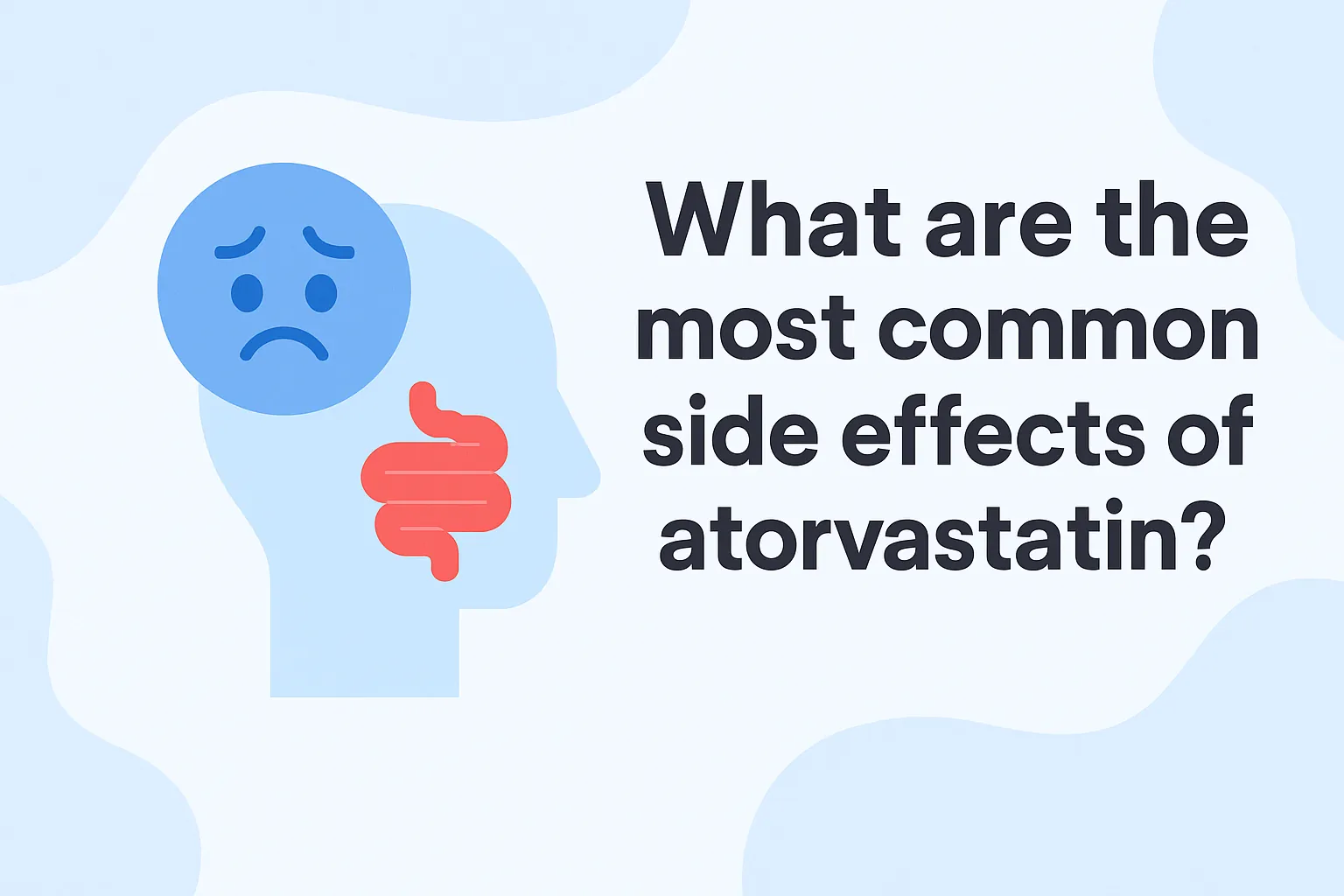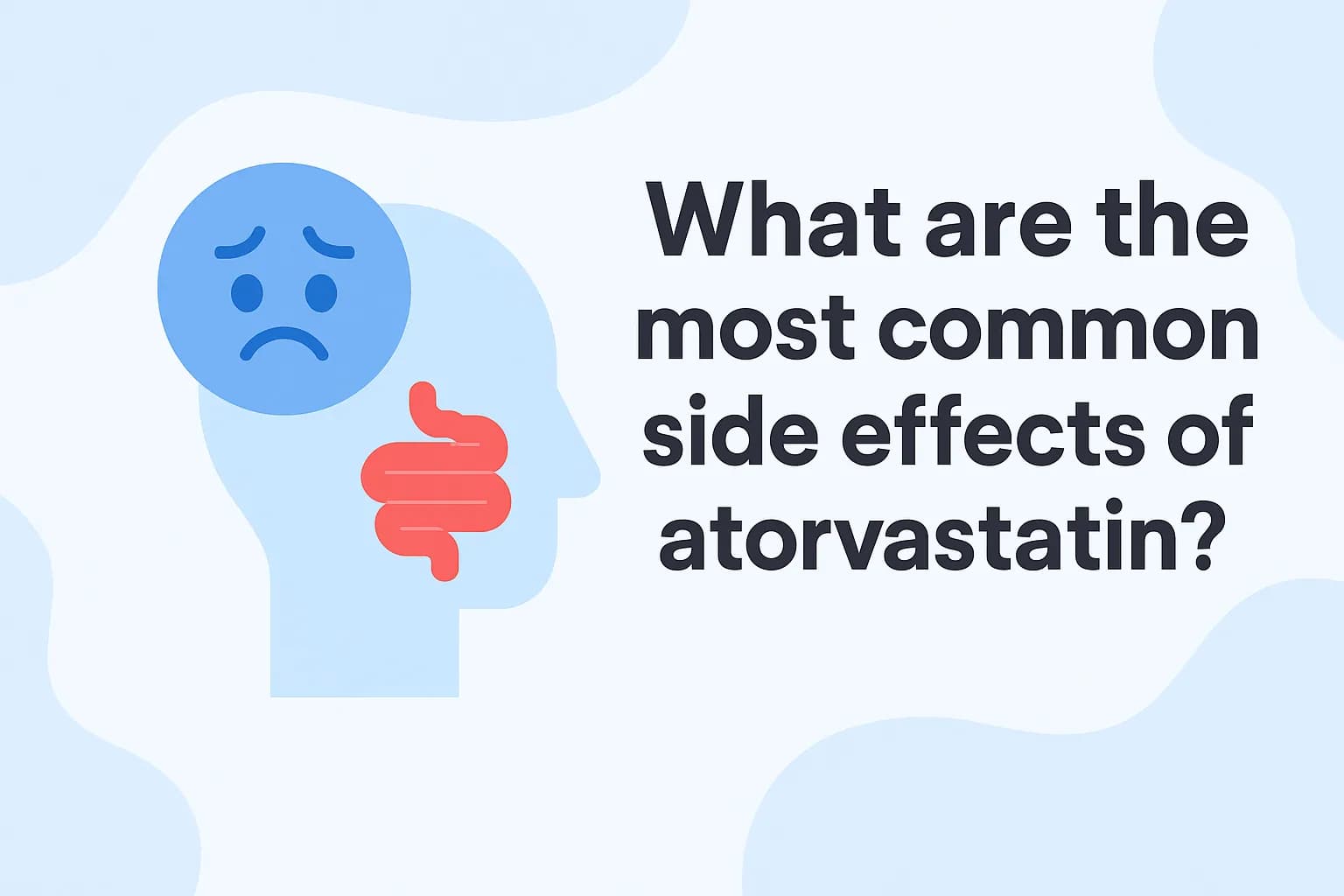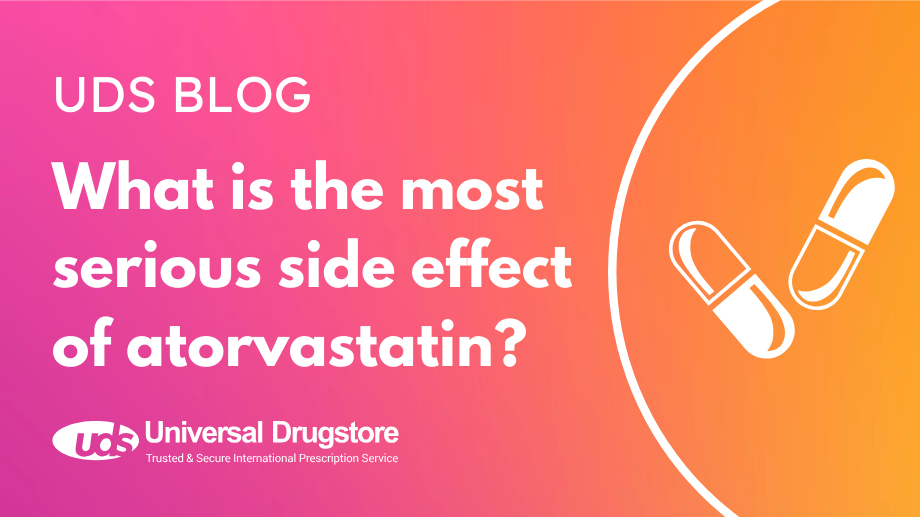What are the most common side effects of atorvastatin?

Atorvastatin is the generic version of the brand-name medication Lipitor. It belongs to a group of medications called statins, or HMG-CoA reductase inhibitors. Atorvastatin works by blocking an enzyme that is needed by your body to make cholesterol, and this reduces the amount of cholesterol in the blood. Like all medications, atorvastatin may cause side effects. The most commonly reported side effects include diarrhea, joint pain, and muscle pain. Serious side effects are rare but also possible. They include kidney, liver, and severe muscle damage.
If you cannot tolerate atorvastatin, there are other options your healthcare provider may recommend for you. Examples may include lowering your dose, stopping it temporarily, or switching medications. Do not stop taking atorvastatin or change your dose without discussing it with your healthcare provider first.
Keep reading as we will go into more detail what side effects occur with atorvastatin as well as some frequently asked questions.
Atorvastatin FAQs
What are the side effects of atorvastatin?
The most common side effects of atorvastatin include:
- Diarrhea (5-14%)
- Common cold symptoms (4-13%)
- Joint pain (4-12%)
- Urinary tract infection (4-8%)
- Pain in arms and legs (3-8%)
- Nausea (4-7%)
- Indigestion (3-6%)
- Insomnia (1-5%)
Some other possible side effects of atorvastatin include:
- Muscle pain or weakness (myopathy)
- Constipation
- Memory loss or impairment, forgetfulness, and confusion
Rarely, atorvastatin may cause severe side effects such as:
- Serious, life-threatening allergic reactions, including anaphylaxis. Symptoms may include hives, skin rash, swelling of your face, lips, tongue, or throat, and shortness of breath.
- Severe muscle pain and damage (rhabdomyolysis)
This medication can cause a rare but potentially life-threatening muscle problem called rhabdomyolysis. Rhabdomyolysis can cause extreme muscle pain, liver damage, kidney failure, and death. Your risk is higher if you take other medications that can interact with atorvastatin and raise the levels of it in your body. If you notice any symptoms of rhabdomyolysis, such as severe muscle pain, dark-colored urine, weakness, and tiredness, stop taking atorvastatin and seek medical attention immediately.
You are also at a higher risk of muscle damage if you drink large amounts of grapefruit juice, are 65 years of age or older, have thyroid problems (hypothyroidism) that are not controlled, have kidney problems, or are taking higher doses of this medication.
Liver problems
Although rare, atorvastatin may cause serious liver problems that can lead to liver failure. You should get blood tests to check your liver function before starting atorvastatin and while you are taking it to make sure your liver is working properly. Get medical attention right away if you notice stomach pain or swelling, yellowing of your skin or the whites of your eyes, black, tarry, or bloody stools, loss of appetite, nausea, vomiting, confusion, or dark-colored urine. You may need to stop taking atorvastatin to prevent further liver damage.
Increased blood sugar
Some research suggests this medication can raise your blood sugar levels. However, most healthcare providers believe that the benefits of atorvastatin outweigh its risk for harm. Let your healthcare provider know if you have high blood sugar levels before starting this medication because you may need to check your blood sugar more often. Also, be sure to eat a healthy, balanced diet and exercise regularly while taking atorvastatin.
Harm to unborn and breastfed babies
Atorvastatin should not be taken by pregnant or breastfeeding females. This medication may cause harm to your unborn and breastfed infant. If you are pregnant, thinking of becoming pregnant, or breastfeeding, ask your provider about the safest options for you.
These are not all of the possible adverse effects of atorvastatin. You should always seek medical advice from a healthcare professional for any questions or concerns about your medical condition or treatment. You should also read all the patient information, including your Medication Guide that comes with atorvastatin. You can report side effects to the FDA at 1-800-FDA-1088 or www.fda.gov/medwatch.
What does atorvastatin treat?
Atorvastatin is approved by the U.S. Food and Drug Administration (FDA) to be used:
- To reduce the risk of heart attack, stroke, chest pain, and certain types of heart surgery in adults who don’t have heart disease but have other risk factors for heart disease.
- To reduce the risk of heart attack and stroke in adults with type 2 diabetes mellitus (T2DM) who do not have heart disease but have other risk factors for heart disease.
- To reduce the risk of heart attack that does not cause death, stroke, certain types of heart surgery, hospitalization for congestive heart failure, and chest pain in adults with heart disease.
- Along with diet to reduce LDL cholesterol in adults and children 10 years and older with a genetic condition that causes high bad cholesterol levels.
- Along with diet for the treatment of adults with high triglyceride levels.
How does atorvastatin work?
Atorvastatin calcium, which belongs to a drug class called HMG-CoA reductase inhibitors (statins), works by blocking the enzyme in your liver that makes cholesterol. This helps lower your bad cholesterol or low-density lipoprotein (LDL). It can also raise your good cholesterol or high-density lipoprotein (HDL) levels and lower your triglyceride levels. Lowering cholesterol with atorvastatin and a healthy diet helps reduce your risk of heart attack and stroke.
What should you tell your healthcare provider before taking atorvastatin?
You should not take this medication if you have an allergy to atorvastatin or any of the inactive ingredients in this product. Tell your provider about all your medical conditions, including:
- Any unexplained muscle aches or weakness
- Liver disease
- Drinking more than 2 alcoholic beverages daily
- Diabetes
- Thyroid disease
- Kidney disease
- A previous stroke
- If you are pregnant or plan to become pregnant
- If you are breastfeeding or plan to breastfeed
What drugs should not be taken with atorvastatin?
Tell your healthcare provider about all your current medications. Atorvastatin may interact with:
- Other cholesterol-lowering medications such as gemfibrozil, fenofibrate, and niacin
- Colchicine
- Antifungals or antibiotics such as rifampin, clarithromycin, erythromycin, ketoconazole, voriconazole, and itraconazole
- Birth control pills
- Immunosuppressants used to prevent organ transplant rejection
- Antiviral medications to treat HIV or hepatitis C
This list is not complete and many other drugs may interact with atorvastatin.
Can atorvastatin cause muscle pain or weakness?
Not everyone who takes atorvastatin will experience muscle pain or weakness. The severity can vary from person to person and may include soreness, aches, stiffness, or cramps. Risk factors include older age, being underweight, high blood pressure, liver or kidney disease, low thyroid, or diabetes. For most people, the muscle pain or weakness will go away on its own. If it becomes severe or bothersome, contact your healthcare provider.
Is hair loss a side effect of atorvastatin?
While uncommon, hair loss has been reported in people taking atorvastatin. It is unclear if the medication is the direct cause. Hair loss could also be due to genetics, vitamin deficiency, stress, or other health conditions. If atorvastatin is the cause, the hair loss is usually not permanent and hair may grow back after stopping. Always talk to your healthcare provider before stopping your medication.
What are statins?
Statins (HMG-CoA reductase inhibitors) are prescribed to millions of people every year to manage high cholesterol. Some statins can decrease bad cholesterol levels by 50% or more. They are usually well tolerated and taken once a day with or without food. Common side effects include cold symptoms, diarrhea, joint or muscle pain, UTIs, and indigestion. Rarely, statins can cause liver damage or severe muscle pain. Your provider will help determine if a statin is right for you.
Related Medications
- Zocor (simvastatin)
- Zetia (ezetimibe)
- Vytorin (ezetimibe/simvastatin)
- Crestor (rosuvastatin)
- Livalo (pitavastatin)
- Pravachol (pravastatin)
- Lescol XL (fluvastatin)
- Mevacor (lovastatin)

